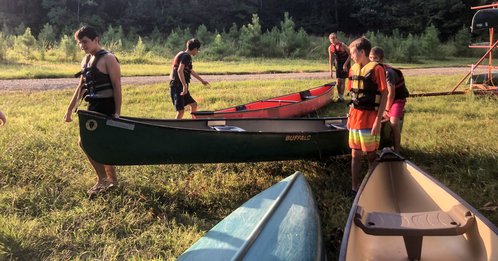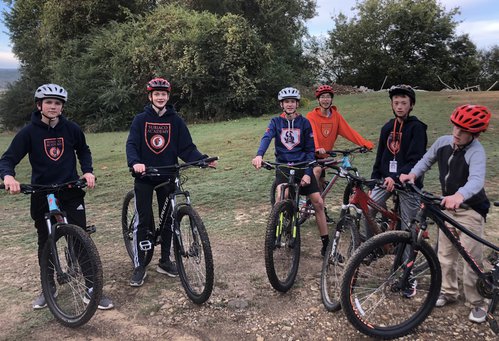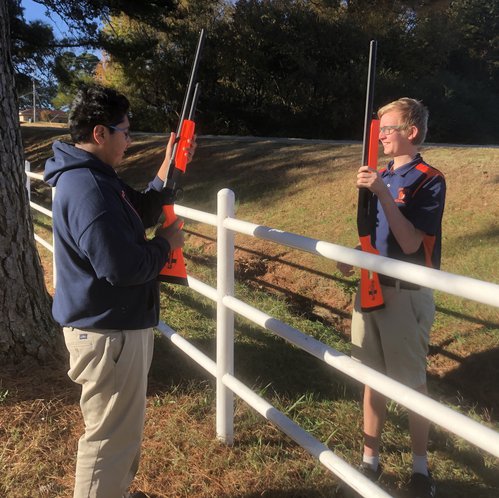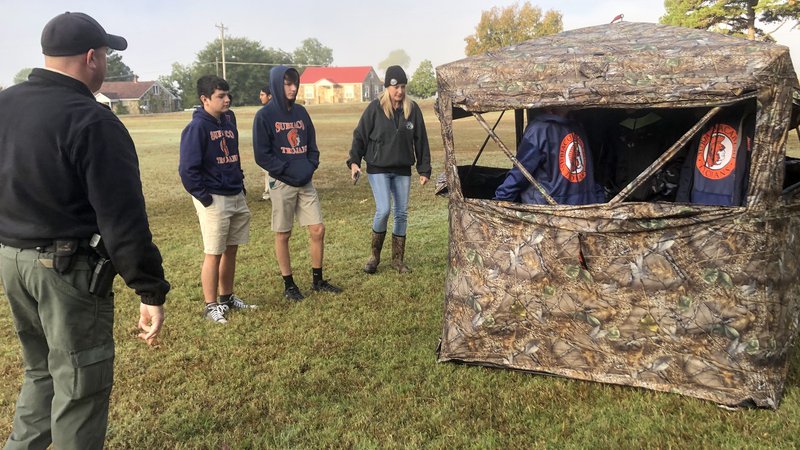Randy Zellers Assistant Chief of Communications
SUBIACO — With 500 acres of wooded terrain beside Mount Magazine Wildlife Management Area, Subiaco Academy has enjoyed a rich history of introducing young men to the outdoors as well as preparing them for productive lives. However, during the last few decades, as pursuits sports and other extracurricular activities have become increasingly organized and some of the more outdoors-oriented faculty have left, there has been a need to revitalize outdoor experiences at the school. Nick McDaniel, a new science teacher on the hill, was hired with the goal of reinvigorating the school’s outdoor program.

Having grown up on an Iowa farm and having a parent who was part of the Iowa Department of Natural Resources, McDaniel was well-versed in the outdoors, but living an outdoor lifestyle and teaching it are two different things. He turned to the Outdoors Adventure Program to help bridge that gap. The program was developed by the Outdoors Tomorrow Foundation and is offered in partnership with the Arkansas Game and Fish Commission. It fosters outdoor education by offering lesson plans and curriculum to support a full year of outdoor education while meeting all teaching standards. While the students taught at Subiaco Academy are all male, the program is developed on a co-ed basis. Writing, math, science and other core subjects are highlighted in the curriculum, so students learn more than the outdoors, they learn about life.

Not only does the program offer curriculum, but it provides contacts and help from AGFC education professionals who can help with subjects such as Hunter Education, Boating Education and Fishing in The Natural State, an education program focused on biology, conservation and angling for some of Arkansas’s favorite sportfish.

Camping, rock-climbing, mountain biking and many other activities are featured throughout the semester-long course, so students always have a new experience waiting when they get to class.
In his first full year with the Outdoors Adventures program, McDaniel has been able to introduce 14 young men in his Physical Education class to the outdoors, as well as 20 to 30 participants through the afterschool program offered through the Academy.
“All of my PE students have completed Hunter Education and Boating Education,” McDaniel said. “We’ve been able to keep students’ attentions and all of them are more willing and excited to get outside, even when conditions are not ideal. And the people at the AGFC have been great in helping teach me how to teach the students. Some have even helped with class trips and lessons.”
Some things that might seem like second nature to many people who have grown up outdoors are foreign to today’s students. It’s not that they are lazy or unable to learn these skills, they’ve just never been in a setting where such skills are prevalent.
“Two students in the program learned to ride a mountain bike for the first time, and a student who really had no interest in mountain biking before the program went out and purchased his own bike to continue enjoying the outdoors,” McDaniel said. “I have one student who just learned to fish who caught his first bream and went through the whole process of cleaning and cooking his catch using one of the program’s camp stoves. It’s just amazing watching some of these young men take an interest in something that was such a formative part of my life and knowing the outdoors experiences available to them throughout their lives because they learned these skills.”
Teachers interested in the Outdoors Adventures Program can learn more from Sheila Connerly, who helps coordinate this and other programs aimed at teaching educators how to incorporate more outdoors education in their daily curriculums. The curriculum and lesson plans must be purchased, but it comes with a matching grant to help purchase equipment needed to conduct the lessons.
“The upfront cost is more to ensure school’s have a vested interest in the program’s success,” Connerly said. “But we can even find programs like the AGFC’s fine money conservation education grants, to reduce that cost even more. Fine money collected in each county is allocated to education grants administered by the Arkansas Department of Rural Services.”
According to McDaniel, OTF also has a monthly newsletter for teachers to really learn how to adapt the program to different settings.
“I’m really fortunate to have such a wonderful setting to teach the outdoors, but there are resources in the newsletter for teachers to teach the basics of paddling or other outdoors recreation in a gym or other indoor setting before taking their students out for a trial run,” McDaniel said. “It’s great for a person who has the desire to take kids outside, but might not have the outdoor knowledge and wants to learn as they go.”
McDaniel hopes to expand the lessons even further in Subiaco Academy’s outdoor education program, adding larger components of outdoor cooking and the AGFC’s Fishing in the Natural State Program to get the students even more comfortable with fishing and cooking their catch.
“People are separated so much from their food, it’s important to me that we help reconnect them with understanding how that whole process works,” McDaniel said. “The curriculum is a great baseline to guide future purchases and develop the process to solicit future grants and donations to enrich the students’ learning experiences even more. We have many more mountain biking, hiking and camping trips planned as well as participation in archery through the [Arkansas National Archery in the Schools] program.
“Each of these experiences may hold a golden nugget to something valuable about life and what is available in the world,’ McDaniel said. “I’ve been given the honor of taking 50 to 60 young men to learn about the outdoors here so far, and every student has found at least one thing they’ve connected to through these experiences.”






